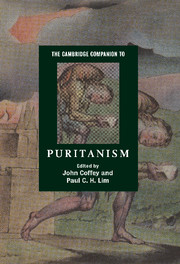Book contents
- Frontmatter
- Introduction
- Part I: English Puritanism
- Part II: Beyond England
- Part III: Major Themes
- 11 Practical divinity and spirituality
- 12 Puritan polemical divinity and doctrinal controversy
- 13 Puritans and the Church of England: historiography and ecclesiology
- 14 Radical Puritanism, c. 1558-1660
- 15 Puritan millenarianism in old and New England
- 16 The godly and popular culture
- 17 Puritanism and gender
- 18 Puritanism and literature
- Part IV: Puritanism and posterity
- Index
18 - Puritanism and literature
from Part III: - Major Themes
Published online by Cambridge University Press: 28 November 2008
- Frontmatter
- Introduction
- Part I: English Puritanism
- Part II: Beyond England
- Part III: Major Themes
- 11 Practical divinity and spirituality
- 12 Puritan polemical divinity and doctrinal controversy
- 13 Puritans and the Church of England: historiography and ecclesiology
- 14 Radical Puritanism, c. 1558-1660
- 15 Puritan millenarianism in old and New England
- 16 The godly and popular culture
- 17 Puritanism and gender
- 18 Puritanism and literature
- Part IV: Puritanism and posterity
- Index
Summary
Puritanism was an intrinsically bookish movement. Just as the spread of Protestantism through Europe in the early sixteenth century was greatly facilitated by, if not dependent upon, the resources of the printing press, so the penetration by Puritanism of the nation's religious, political and cultural life was achieved primarily through the printed word. Religious works comprised at least half the 100,000 or so titles that represent the total output of the press from the accession of Elizabeth in 1558 to the end of the seventeenth century. Of these, a very significant proportion - and during periods in the seventeenth century a majority - were Puritan. They included the century's bestsellers which sold in unprecedented numbers: Arthur Dent's fictionalised dialogue The Plaine Mans Path-way to Heaven (1601) went through over thirty editions by 1682; John Ball's Short Catechisme (1615?) nearly sixty editions by 1689; Richard Baxter's 600-page treatise on preparing for The Saints' Everlasting Rest (1650) reached its fourteenth edition by 1688 and his evangelistic A Call to the Unconverted (1658) its twenty-eighth edition by 1696; the first part of John Bunyan's The Pilgrim's Progress (1678) reached its twenty-second edition by the end of the century. Contemporaries recognised the extraordinary asset that had been, as they firmly believed, providentially placed in their hands. 'Printing', wrote Richard Baxter, 'hath been a blessed means of increasing knowledge and religion' for 'the Press hath a louder voice' than that of any single person: 'the Writings of Divines are nothing else but a preaching the Gospel to the eye, as the voice preacheth it to the ear'.
- Type
- Chapter
- Information
- The Cambridge Companion to Puritanism , pp. 309 - 324Publisher: Cambridge University PressPrint publication year: 2008
- 2
- Cited by



